牛津八上Unit8 Welcome to the unit
牛津译林版英语八年级上册-8A-Unit6-Welcome-to-the-unit
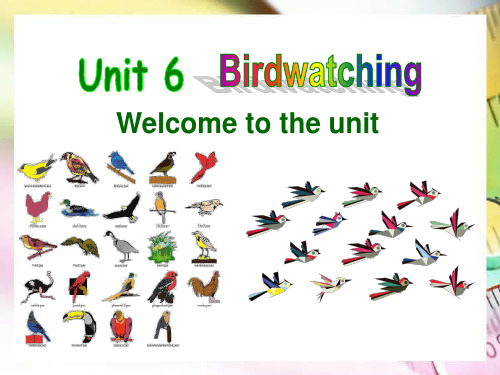
cheap.
5.The baby bird grew up under the mother bird’s
_w_i_n_g__s_(翅膀).
6. I have five __t_y_p_e_s_/_k_i_n_d_s___(种类) of books.
metres wide.
Birdwatching
构词方式
★ fly kites—— kite flying 放风筝(活动/运动)
★ collect stamps——stamp collecting集邮 (爱好)
★ pick apples——apple picking 摘苹果(活动/ 事件)
to go on a trip to the zoo.
3.Children need parents’ _p_r_o_te_c_t_io_n_(保护). 4.It’s _m__e_a_n_in__g_fu_l__(mean) to protect the wild
animals.
5.---What did she mean by saying“Ape”?
Welcome to the unit
Learning aims
揭标引学
1.通过漫画引出观鸟的话题。 2.了解几种鸟类的英文名称和基本特点。 3.学会用英语谈论鸟类。
Animals are our friends. Birds are also man’s friends in the world. There are thousands of types/kinds of colourful birds for us to study (研究).
牛津译林版英语八上(8A)Unit2Schoollife知识点复习

牛津译林版英语八上(8A)Unit2Schoollife知识点复习牛津译林版英语八上牛津译林版英语八上((8A )Unit2 School life 知识点知识点复习复习Important phrases and sentences:Welcome to the unit1.Why don ’t sb. do sth.?= Why not do sth.? 为什么不做……?2.work harder. 更加努力3.What ’s school like? It ’s like watching TV . be like doing sth. (like 介词,介词+doing)4.fewer advertisements 更少的广告an advertisement 一则广告few/many advertisements 5.British English/ American English英式英语/美式英语6.have some plans for the weekend 有一些周末计划7.see/watch a film 看电影Reading8.in Year 8 (Year Eight) 名词+基数词(首字母都要大写)= in Grade Eight= in the eighth grade 一般情况下:名词+基数词(首字母都要大写)= the +序数词+名词(首字母小写)eg. Lesson One = the first lesson9.a mixed school. 一所男女生混合的学校10.have lessons together 一起上课11.among all my subjects 在我所有的学科当中12.like French best 最喜欢法语13.Learning foreign languages is fun. 动名词做主语,谓语动词用单数(language 作为语言不可数名词,而具体的语言是可数名词five languages 14.fun n.乐趣;娱乐活动;嬉戏,嬉闹;有趣的事adj.使人愉快的;开心的funny adj.滑稽的,可笑的what (great/good) fun! have fun doing = It is fun to do ... (都不要冠词)15.foreign languages 外语(foreigner n, 外国人)16.a Reading Week 阅读周during the week 在这周期间17.borrow 主语借入lend 主语借出borrow sth. from sb. 向某人借某物(借进)lend sth. to sb. = lend sb sth 把某物借给某人(借出)18.bring in 带来bring in books and magazines from home 从家中带来书和杂志19.near the end of the week临近每周结束时at the end of the street 在街道的尽头20.discuss sth with sb 与某人讨论某事discuss the books with our classmates in class课堂上与同学一起讨论书的内容21.seem to go faster 似乎走得更快seem to do sth. 似乎做某事seem (to be) +adj.It seems that + 从句It seems that he is angry seem angry 似乎很生气eg. He seems(to be) unhappy today.他今天似乎不高兴22.go to the Buddy Club 去同伴俱乐部23.learn more about the school 更多地了解这个学校24.listen carefully to my problems 仔细地倾听我的问题25.offer me help 向我提供帮助offer sb. sth. = offer sth. to sb. 向某人提供某物offer to do sth 主动提出做某事26.end earlier than usual.比往常结束得更早27.do sports together一起做运动28.twice a week 一周两次29.practice hard every time 每次努力练习practice doing sth 练习做某事30.win two games 赢得两场比赛31.an article by a boy from the USA.一篇美国男孩写的文章32.what else = what other things 其他的还有什么Grammar and Integrated skills/doc/65548791.html,e first in the race 在比赛中得第一名34.any other +名词单数= the other +名词复数any other student = the other studentsShe draws better than any other student in my class = She draws better than the other students in my class…的数量(谓语动词用单数形式)35.the number of …The number of the students in our school is about 1500 我们学校学生的数量大约是1500个许多,大量(谓语用复数) A number of students are playing football 许多学生a number of …在踢足球36.do morning exercises 做早操take some exercise “锻炼”不可数,其余都可数37.spend ... on sth. / (in) doing sth. 花费......做某事spend more time doing homework = spend more time on homework花更多的时间做作业spend the least time on homework = spend the least time doing homework花最少的时间做作业38.have (some time )off休息(一段时间)have two weeks off = have a two-week holiday休两周假39.half an hour 半小时three hours and a half= three and a half hours 三个半小时40.half an hour for playing computer games 半小时玩电脑游戏41.another half an hour for playing chess 还有半小时下象棋42.at most 最多,至多at least至少43.do some reading/cooking/shopping/cleaning 阅读/做饭/ 购物/ 打扫44.two hours for sports 两小时体育活动among the four of us 我们四个人中45.far—farther/ further---farthest/ furthest 但表示程度深时只能用further further study 深造Study skills and Task46.have an English test 进行一次英语测试47.have a monthly test on each subject举行各科月考48.look through 浏览look through the questions quickly快速浏览问题49.read English newspapers and magazines 读英语报刊和杂志at first 首先,起初50.keep writing in English about my daily life不断地用英语写关于我的日常生活51.learn to use English better 学会更好地使用英语52.watch English videos 观看英语录像53.have a lovely time 玩得很愉快54.my ideal school 我理想的学校(adj)55.finish school 毕业56.need to get up early 需要早起57.have lots of time for after-school activities 有许多时间进行课外活动58.half an hour of homework 半个小时的作业have an hour for lunch 有一小时午餐(时间)59.a big clean dining hall 一个大而清洁的餐厅60.wear uniforms 穿校服wear ties 系领带61.choose subjects to study 选择学科来学习62.a football field 足球场 a swimming pool 游泳池63.go on a school trip 进行一次学校旅行64.have fun = have a lovely/good/nice/great/wonderful time 玩得愉快语法A.比较事物的数量1.many (修饰可数名词)/much (修饰不可数名词)----more ----most比…..数量多.more + 可数名词复数/ 不可数名词+ than ...…Eg;I have more friends than you.2.few (修饰可数名词) -----fewer----fewestlittle (修饰不可数名词)----less-----leastfewer +可数名词复数+ than ……比…..数量少There are fewer boys than girls in our class.less + 不可数名词+than ……比…..数量少I spend less money on food than my sister.3.the fewest +可数名词复数在….中最少He has the fewest books.4.the least +不可数名词在….中最少She has the least money of us.5. the most + 可数名词复数/ 不可数名词最多Daniel has the most money.B.副词的比较级和最高级1.一般在词尾直接加er或est,例如,hard-harder-hardestfast-faster-fasterestLoud-louder-loudest2、部分双音节词和多音节词分别在原级前加more构成比较级和most构成最高级,例如:Slowly-more slowly-most slowlyClearly-more clearly-most clearly Carefully-more carefully-most carefully 3、副词比较级和最高级的不规则变化well-better-bestbadly-worse-worst。
牛津译林版八年级英语上册Unit3Welcometotheunit教学设计

此外,教师还教授学生如何运用这些语法知识描述名人的成就和经历,让学生在实际语境中学会运用所学知识。
(三)学生小组讨论,500字
在学生小组讨论环节,教师将学生分成若干小组,每组选择一个名人作为讨论对象。小组成员共同探讨名人的成就、经历和成功因素,并使用本节课所学的词汇和语法知识进行描述。
难点:在听力过程中,快速捕捉关键信息,并进行有效信息整合。
3.重点:培养阅读技巧,通过阅读文章获取信息,理解文章主旨。
难点:在阅读过程中,准确把握文章细节,并进行推理判断。
4.重点:提升学生的写作能力,能够仿写关于名人的短文。
难点:在写作过程中,注意文章结构的安排,运用恰当的语法和词汇。
(二)教学设想
提交方式:录制对话视频或音频,上传至班级群。
4.听力作业:为学生提供一段关于名人的英文听力材料,要求学生在课后反复聆听,提高听力水平。
提交方式:完成听力练习题,提交答案。
5.拓展作业:鼓励学生关注国内外名人的动态,了解他们的最新成就和事迹。可以选择关注一位名人,持续关注其动态,并在课堂上与同学分享。
1.采用任务型教学法,设计真实、有意义的语言情境,激发学生的学习兴趣和参与意识。
2.利用多媒体教学资源,如图片、视频等,帮助学生直观地了解名人及其事迹。
3.组织小组合作学习,培养学生的团队协作能力和交流沟通能力。
4.创设互动式课堂氛围,鼓励学生积极参与课堂活动,提高口语表达能力。
5.引导学生通过自主阅读、讨论等方式,培养独立思考和解决问题的能力。
三、教学重难点和教学设想
牛津译林版八年级英语上册Unit8Reading1学案.docx
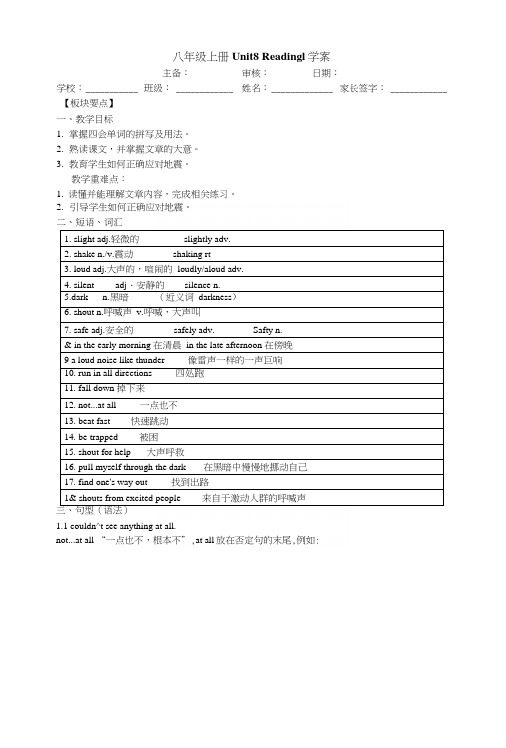
八年级上册Unit8 Readingl学案主备:审核:日期:学校:___________ 班级: ____________ 姓名:_____________ 家长签字:____________ 【板块要点】一、教学目标1.掌握四会单词的拼写及用法。
2.熟读课文,并掌握文章的大意。
3.教育学生如何正确应对地震。
教学重难点:1.读懂并能理解文章内容,完成相关练习。
2.引导学生如何正确应对地震。
二、短语、词汇1. slight adj.轻微的slightly adv.2. shake n./v.震动shaking rt3. loud adj.大声的,喧闹的loudly/aloud adv.4. silent adj・安静的silence n.5.dark n.黑暗(近义词darkness)6. shout n.呼喊声v.呼喊,大声叫7. safe adj.安全的safely adv. Safty n.& in the early morning 在清晨in the late afternoon 在傍晚9 a loud noise like thunder 像雷声一样的一声巨响10. run in all directions 四处跑11. fall down 掉下来12. not...at all 一点也不13. beat fast 快速跳动14. be trapped 被困15. shout for help 大声呼救16. pull myself through the dark 在黑暗中慢慢地挪动自己17. find one's way out 找到出路1& shouts from excited people 来自于激动人群的呼喊声三、句型(语法)1.1 couldn^t see anything at all.not...at all “一点也不,根本不”,at all放在否定句的末尾,例如:八年级上册Unit8 Readingl 学案主备:审核:日期:学校: ___________ 班级: _____________ 姓名: ____________ 家长签字: ____________ 【课前导学】1. 在学习了 Welcome to the unit 后,还记得学习的自然灾害的名称吗?赶快写下来吧:2. 预习了 Reading 后,你能了解每一段的大意吗?试着対下面的内容进行连线。
牛津译林版8B Unit8 A green World Welcome to the unit课件(共35张PPT)

2. Will more trees be planted this year? 今年更多的树将会被种植吗? 句中will be planted 意思是“将会被种 植”,“will be + 动词的过去分词”是一 般将来时的被动语态。 e.g. The panda will be sent to the zoo tomorrow. 这只大熊猫明天将被送到动物园。
turn off 关上(开关) e.g. We can save energy by turning off the lights when we leave.
recycle
vt. 回收利用,循环利用
e.g. We can protect the environment by recycling things.
d. We can protect the environment by recycling waste.
Listen and answer
1. How did Kitty go to school in the past? Her father used to drive her to school. 2. What about now? They take the underground now. 3. What does Millie think she should do to live a green life?
8B Unit8 A green World
Welcome to the unit
Did you know that all around the world, 3 to 6 billion trees are cut down each year? Have you ever planted a tree?
江苏地区牛津译林版八年级上册英语课件8AU2welcometotheunitandcomicstripe

初 中 英 语
八 上
Listening and answering
What does Eddie think school is like? Eddie thinks that it’s _______________, like watching TV but there are____________________. fewer advertisements
football
eraser
初 中 英 语
八 上
Part Four Practice Please changing the British English intoAmerican English I am a boy from England. I am a Grade 8 student. I like playing football. soccer And I am good at maths math . Autumn Fall is coming. So my best friend, Max’s birthday is coming too.
初 中 英 语
八 上
Reading Eddie and Hobo’s conversation
初 中 英 语
八 上
Completing the dialogue Hobo:Why _____ don’t dogs go to school, Eddie? Eddie:Because we’re ________ smarter than people. Hobo:What is school _____? like
初 中 英 语
八 上
《牛津初中英语》8A
Unit 2 School life
牛津译林版英语八年级上册《Unit3AdayoutWelcometotheunit》说课稿1

牛津译林版英语八年级上册《Unit 3 A day out Welcome to the unit》说课稿1一. 教材分析《Unit 3 A day out Welcome to the unit》是牛津译林版英语八年级上册的一单元。
本单元主要围绕着“一天的郊游”这个主题展开,通过介绍不同地点的风景和活动,让学生学会描述和规划一次郊游活动。
教材内容丰富,插图生动,激发学生的学习兴趣,同时也培养了他们的观察力和想象力。
二. 学情分析根据我对学生的了解,他们已经掌握了基本的英语语法和词汇,具备一定的听说读写能力。
但是在实际运用中,部分学生还存在一定的困难,如口语表达能力较弱,写作能力有待提高等。
此外,学生的学习兴趣和学习动机也是影响教学效果的重要因素。
三. 说教学目标1.知识目标:学生能够掌握本单元的重点词汇和句型,如“go for awalk”、“visit a museum”等,并能够运用它们描述一次郊游活动。
2.能力目标:学生能够听懂、会说本单元的主题句子,提高口语表达能力;同时,能够运用所学的词汇和句型进行写作,提高写作能力。
3.情感目标:通过本单元的学习,学生能够培养对自然风光和户外活动的热爱,提高生活品质。
四. 说教学重难点1.重点:本单元的重点是让学生掌握描述一次郊游活动的词汇和句型,提高他们的口语表达和写作能力。
2.难点:学生需要能够在实际情境中正确运用所学的词汇和句型,进行流畅的口语表达和写作。
五. 说教学方法与手段1.教学方法:采用任务型教学法,让学生在完成实际任务的过程中,运用所学知识,提高语言能力。
2.教学手段:利用多媒体课件、图片等教学资源,创设情境,激发学生的学习兴趣。
六. 说教学过程1.导入:通过展示一幅美丽的自然风光图片,引导学生谈论他们对户外活动的看法,激发学生的学习兴趣。
2.新课呈现:教师通过展示不同地点的风景和活动图片,引入本课的主题,同时教授相关词汇和句型。
3.任务型活动:学生分组讨论,规划一次郊游活动,并运用所学的词汇和句型进行描述。
牛津译林版英语八上8AUnit1FriendsWelcometotheunit
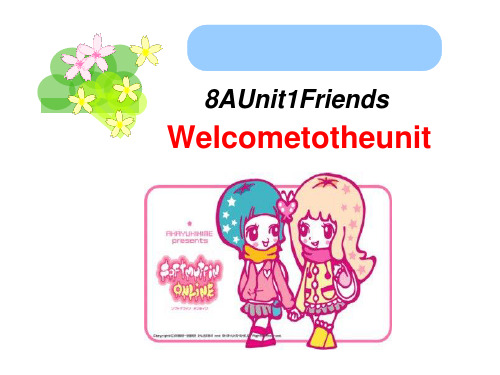
Wealsohaveagoodfriend,Eddie.Heisfunn yandcanalwaysmakeushappy.WhoisEd die’sgoodfriend?Whydoyouthinkso?L et’shavealook.
Lookatthevideoanddiscuss.
DoyouthinkEddieandHoboaregoodfriend s?Why?
Whodoyoulikebetterasafriend,Eddi eorHobo?Why?
1.sokind:so意思是“如此,太…”,ห้องสมุดไป่ตู้跟形容 词。
sobeautiful,soclever…
sohard-workingaboy(so+adj.a+n.)
=suchahard-workingboy(sucha+adj.+ n.)
Debate
Whatqualitiesarevery/quite/notimportantinago odfriend? Sentencesmaybeused: Ithinkmygoodfriendshouldbevery…because … Iagree./Idon’tagreewithyoubecause… It’squiteimportantforafriendtobe…?Doyou thinkso? Idon’tthinkmygoodfriendmustbevery…
makemehap py sharesmyjoy
Whenyouaresad,doyouoftentalktoyourfrien d?Why? Whenyouarehappy,doyouoftentalktoyourfr iend?Why? Canyoutellyourfriendeverythingaboutyours elf?Why? Whenyouhaveproblems,doyouoftentalktoyo urfriend?Why? Doyoubelievewhatyourfriendsays?Why?
Unit 8 Natural disasters Welcome-课件 八年级英语上册(牛津译林版)

Presentation
Listen and Answer
1. What happened to Vivien’s school last week?
There was a heavy storm with thunder and
lightning, and the school caught fire. 2. What caused the fire in Vivien’s school?
A: Did you hear about the…+时间?
B: No. What happened? A: It was in +地点.... (描述)
what
a flood
when
last month
where
Wuhan
consequence It washed away villages.
s(后果)
Presentation
Listen and imitate
Presentation
1. Pay attention to your tone and intonation (语调);
2. Use your body language.
Presentation
Let’s fill
一:此句是由when连接的复
typhoon
Sometimes bad weather may cause disasters.
Free Talk
A: What’s the weather like?
B: It’s…
foggy
windy
snowy
y
牛津译林版八年级英语上册Unit8知识点归纳
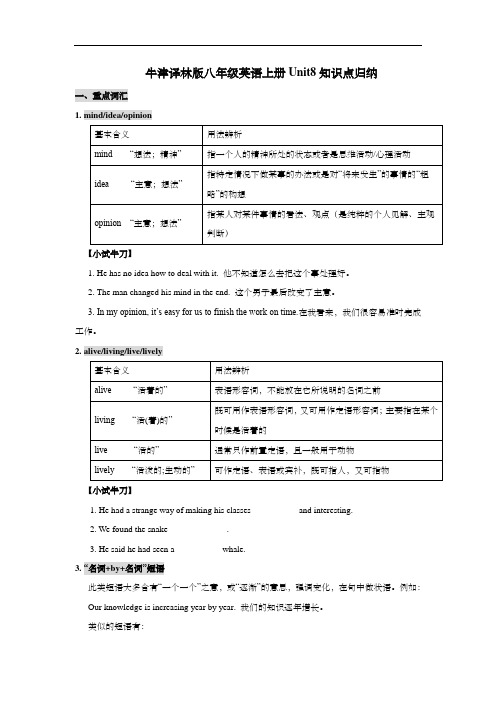
牛津译林版八年级英语上册Unit8知识点归纳一、重点词汇1. mind/idea/opinion【小试牛刀】1. He has no idea how to deal with it. 他不知道怎么去把这个事处理好。
2. The man changed his mind in the end. 这个男子最后改变了主意。
3. In my opinion, it’s easy for us to finish the work on time.在我看来,我们很容易准时完成工作。
2. alive/living/live/lively【小试牛刀】1. He had a strange way of making his classes___________and interesting.2. We found the snake _____________.3. He said he had seen a___________whale.3. “名词+by+名词”短语此类短语大多含有“一个一个”之意,或“逐渐”的意思,强调变化,在句中做状语。
例如:Our knowledge is increasing year by year. 我们的知识逐年增长。
类似的短语有:二、语法点拨过去进行时1. 基本用法过去进行时表示过去某一时刻或某一阶段正在进行着的动作,一般与表示过去的时间状语,如: then, at that time, at six, (at this time)yesterday, from 8 to 10 last night等连用;但有时没有这些时间状语,而通过上下文的联系来表示。
①表示过去某一时刻正在进行的动作。
What were you doing at eight this morning? 今天早晨八点钟你在做什么?She was working on the problem this time yesterday. 她昨天这时候正在解那道题。
牛津译林版英语八年级下册《Unit8AgreenworldWelcometotheunit》说课稿8
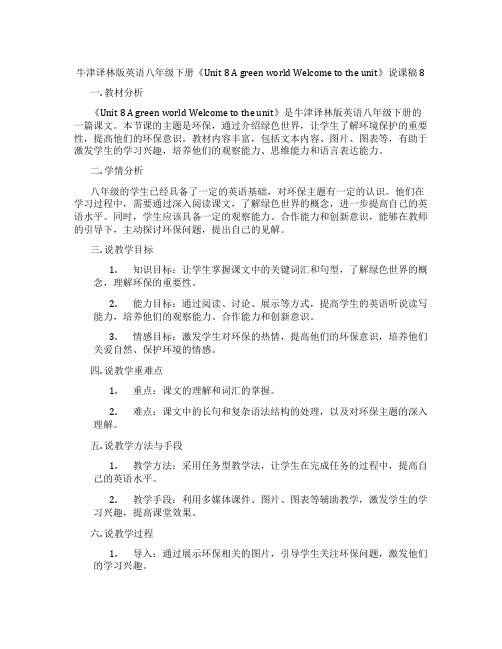
牛津译林版英语八年级下册《Unit 8 A green world Welcome to the unit》说课稿8一. 教材分析《Unit 8 A green world Welcome to the unit》是牛津译林版英语八年级下册的一篇课文。
本节课的主题是环保,通过介绍绿色世界,让学生了解环境保护的重要性,提高他们的环保意识。
教材内容丰富,包括文本内容、图片、图表等,有助于激发学生的学习兴趣,培养他们的观察能力、思维能力和语言表达能力。
二. 学情分析八年级的学生已经具备了一定的英语基础,对环保主题有一定的认识。
他们在学习过程中,需要通过深入阅读课文,了解绿色世界的概念,进一步提高自己的英语水平。
同时,学生应该具备一定的观察能力、合作能力和创新意识,能够在教师的引导下,主动探讨环保问题,提出自己的见解。
三. 说教学目标1.知识目标:让学生掌握课文中的关键词汇和句型,了解绿色世界的概念,理解环保的重要性。
2.能力目标:通过阅读、讨论、展示等方式,提高学生的英语听说读写能力,培养他们的观察能力、合作能力和创新意识。
3.情感目标:激发学生对环保的热情,提高他们的环保意识,培养他们关爱自然、保护环境的情感。
四. 说教学重难点1.重点:课文的理解和词汇的掌握。
2.难点:课文中的长句和复杂语法结构的处理,以及对环保主题的深入理解。
五. 说教学方法与手段1.教学方法:采用任务型教学法,让学生在完成任务的过程中,提高自己的英语水平。
2.教学手段:利用多媒体课件、图片、图表等辅助教学,激发学生的学习兴趣,提高课堂效果。
六. 说教学过程1.导入:通过展示环保相关的图片,引导学生关注环保问题,激发他们的学习兴趣。
2.阅读理解:让学生阅读课文,回答相关问题,理解绿色世界的概念,掌握课文中的关键词汇和句型。
3.讨论:分组讨论课文中的环保问题,让学生提出自己的见解,培养他们的观察能力和创新意识。
4.展示:各小组代表展示讨论成果,其他学生进行评价,提高他们的语言表达能力和合作能力。
牛津译林版八年级英语下册Unit8comicandwelcometotheunit说课稿
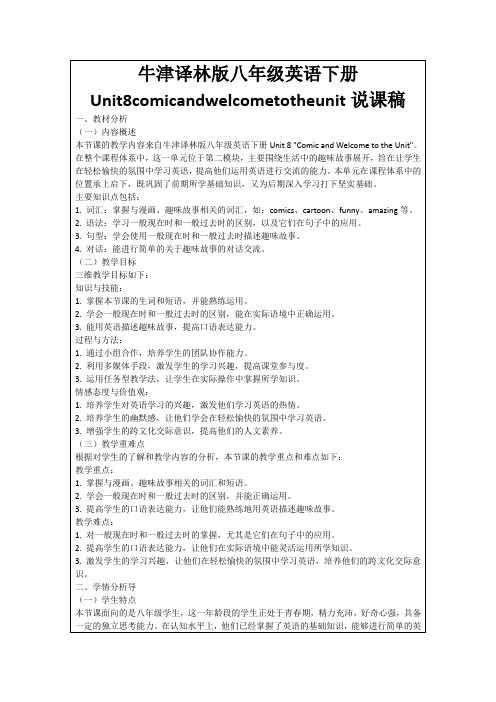
三、教学方法与手段
(一)教学策略
我将采用任务型教学法作为主要教学方法。任务型教学法以学生为中心,注重学生在实际语境中运用所学知识解决问题,培养学生的语言实际运用能力。这一方法的理论依据是交际法教学理论,认为语言学习的目的是为了交际,通过完成具体的任务来促进学生的语言习得。
(二)学习障碍
学生在学习本节课之前,已经掌握了英语的基本语法、词汇和句型。然而,他们可能在学习过程中遇到以下障碍:
1.对一般现在时和一般过去时的区别理解不够深入,容易混淆。
2.口语表达能力有限,用英语描述趣味故事时可能出现表达不清的情况。
3.部分学生对学习英语缺乏信心,课堂参与度不高。
(三)学习动机
2.学生在口语练习时可能存在害羞、不敢开口的现象。
3.课堂时间有限,可能无法让所有学生都有充分的机会参与互动。
为应对这些问题,我将:
1.通过小组活动和个别辅导,帮助学生巩固语法知识。
2.创设轻松的课堂氛围,鼓励学生大胆开口,增强自信心。
3.合理安排课堂时间,确保每个学生都能参与到课堂活动中。
课后,我将通过以下方式评估教学效果:
2.角色扮演:让学生扮演故事中的角色,进行情景对话,提高他们的口语表达能力。
3.课堂提问:教师提问,学生回答,鼓励学生积极参与课堂讨论,锻炼他们的思维能力和口语表达能力。
4.小组竞赛:设置小组竞赛,激发学生的竞争意识和团队合作精神。
四、教学过程设计
(一)导入新课
为了快速吸引学生的注意力和兴趣,我将采用以下方式导入新课:
三维教学目标如下:
知识与技能:
1.掌握本节课的生词和短语,并能熟练运用。
2.学会一般现在时和一般过去时的区别,能在实际语境中正确运用。
Comic strip and welcome to the Unit 课件牛津译林版八年级英语上

What can you do in summer ?
It’s _h_o_t_, we can __e_a_t _ic_e_c_r_ea_m_____, _g_o_s_w_i_m_m__in_g_____ and _p_la_y_v_o_l_le_y_b_a_ll__ on the beach.
What can you do in autumn?
We should discover the beauty in diffEearecnhtsseeaassoonnhs aasnidtsgoowonutbseidaeutwyi!th our
parents and friends to enjoy our lives!
Discussion ----How to protect nature
It’s _c_o_o_l (凉爽的) and _c_lo_u_d_y__ (多云的), we can p_i_c_k_a_p__p_le_s_, _h_a_v_e__a_p_i_c_n_ic_ and _p_l_a_y_f_o_o_t_b_a_ll_.
summer
The weather is often sunny. We usually go swimming in rivers and lakes.
译林出版社八年级上册 英语
Unit 7 Seasons(第一课时)
Comic strip and Welcome to the unit
What are we going to learn?
1. To learn how to describe weather and seasons.
2. To be able to discuss our favourite seasons.
牛津译林版英语八年级上册Unit8WelcometotheunitComicstrip教学设计

一、教学目标
(一)知识与技能
1.掌握本章节的核心词汇和短语,如“fantasy”, “adventure”, “magical”, “journey”, “hero”等,并能熟练运用这些词汇进行简单的英语对话和写作。
4.词汇练习:完成课后词汇练习,包括填空、选择题等,巩固所学词汇和短语。要求学生在完成练习后,互相批改,共同提高。
5.语法巩固:针对一般过去时的用法,学生需完成课后语法练习,包括改错、句型转换等。通过练习,加深对语法知识的理解和运用。
6.阅读拓展:推荐学生阅读一部关于冒险或奇幻的英文原著,提升阅读理解能力,拓展知识面。要求学生撰写读后感,分享自己的阅读心得。
(三)情感态度与价值观
1.培养学生对英语学习的兴趣,提高他们的自信心和自主学习能力。
2.借助故事情境,引导学生树立正确的价值观,如勇敢、善良、团结等。
3.通过学习Comic strip,培养学生幽默感,使他们学会在生活中学以致用,提高生活质量。
4.鼓励学生积极参与课堂活动,发挥自己的想象力,勇于表达自己的观点和看法。
2.语法:一般过去时的运用是本章节的语法重点,学生需要通过具体的语境来理解和练习该时态。
-难点:一般过去时的构成和在不同情境下的正确运用,以及与其他时态的区分。
3.阅读理解:Comic strip作为独特的阅读材料,要求学生能够理解其中的幽默和隐含意义。
-难点:把握Comic strip的叙事风格和幽默元素,提升阅读的深度和广度。
2.各小组展示自己的故事,其他小组进行评价,提出建议和改进意见。
3.教师巡回指导,解答学生在讨论过程中遇到的问题,给予鼓励和指导。
牛津译林版8A Unit8 Natural disasters welcome to the unit课件(共34张PPT)

Task3: Work in pairs
1 point
Act out the dialogue
Show Time
2 points
现在 某一时刻_____ 正在 进行的动作 1. 现在进行时:表示_____ is am are 基本结构: ____/____/____+doing 过去 某一时刻_____ 正在 进行的动作 过去进行时:表示_____ was were were 基本结构:____/____+doing (单数was ____/复数____)
He was sleeping when it started to rain.
2.Did Hobo hear the rain?
3.What did Hobo want Eddie to do?
No, he didn’t.
He wanted Eddie to mop up the water.
It’s raining. My house is all wet. Can I come in, Eddie? Sure, come in. I was sleeping when it started to rain.
练习:My mother ___________ was cooking in the kitchen when I arrived home yesterday. Amy and Tom __________ were doing their homework at nine last night.
学会区分自然灾害和人为事故。
3.Learn to cherish life and love the nature.
珍视生命,热爱自然。
江苏新教材牛津英语八年级上册 Unit 8 Natural disasters Welcome to the unit

学习目标
2.技能目标: 了解几种常见的自然灾害的英文 名称。 学会简单谈论常见的自然灾害及 其导致的后果。 3.情感目标:了解自然灾害给人 类带来的灾难之后,明白我们 应该保护自然环境,珍惜自然。
Free talk
What date is it today?
It is December 24, Christmas Eve.
The girl was doing homework __________________ (做家庭作业)in her bedroom when the thunder and lightning came.
A man and a woman were walking _____________ (步行) in the water.
7. Young boy falls from tree and hurts legs. Accidents
8. Big storm kills 20 people.
Disasters
Finish Part A on Page 93.
Sandy and Millie are chatting online about natural disasters and accidents. Listen and find out : What are they talking about, a natural disaster or an accident?
Disasቤተ መጻሕፍቲ ባይዱers
3. Car accident kills three men Accidents
4. Coach crashed into tree.
Accidents
5. Flood washes away village.
Welcome to the unit--Grammar知识点汇总-牛津译林版八年级英语下册
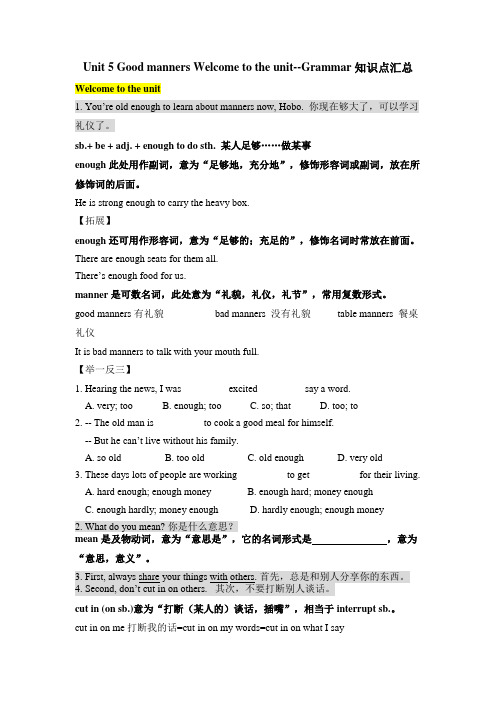
Unit 5 Good manners Welcome to the unit--Grammar知识点汇总Welcome to the unit1. You’re old enough to learn about manners now, Hobo. 你现在够大了,可以学习礼仪了。
sb.+ be + adj. + enough to do sth. 某人足够……做某事enough此处用作副词,意为“足够地,充分地”,修饰形容词或副词,放在所修饰词的后面。
He is strong enough to carry the heavy box.【拓展】enough还可用作形容词,意为“足够的;充足的”,修饰名词时常放在前面。
There are enough seats for them all.There’s enough food for us.manner是可数名词,此处意为“礼貌,礼仪,礼节”,常用复数形式。
good manners有礼貌bad manners 没有礼貌table manners 餐桌礼仪It is bad manners to talk with your mouth full.【举一反三】1. Hearing the news, I was _________excited _________say a word.A. very; tooB. enough; tooC. so; thatD. too; to2. -- The old man is _________ to cook a good meal for himself.-- But he can’t live without his family.A. so oldB. too oldC. old enoughD. very old3. These days lots of people are working _________ to get _________ for their living.A. hard enough; enough moneyB. enough hard; money enoughC. enough hardly; money enoughD. hardly enough; enough money2. What do you mean? 你是什么意思?mean是及物动词,意为“意思是”,它的名词形式是,意为“意思,意义”。
牛津译林版八年级上册Unit4《Doityourself》(WelcometotheUnit)说课稿
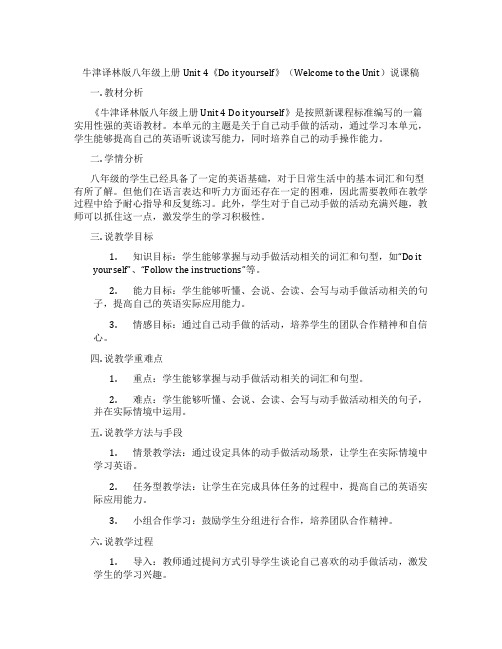
牛津译林版八年级上册Unit 4《Do it yourself》(Welcome to the Unit)说课稿一. 教材分析《牛津译林版八年级上册Unit 4 Do it yourself》是按照新课程标准编写的一篇实用性强的英语教材。
本单元的主题是关于自己动手做的活动,通过学习本单元,学生能够提高自己的英语听说读写能力,同时培养自己的动手操作能力。
二. 学情分析八年级的学生已经具备了一定的英语基础,对于日常生活中的基本词汇和句型有所了解。
但他们在语言表达和听力方面还存在一定的困难,因此需要教师在教学过程中给予耐心指导和反复练习。
此外,学生对于自己动手做的活动充满兴趣,教师可以抓住这一点,激发学生的学习积极性。
三. 说教学目标1.知识目标:学生能够掌握与动手做活动相关的词汇和句型,如“Do ityourself”、“Follow the instructions”等。
2.能力目标:学生能够听懂、会说、会读、会写与动手做活动相关的句子,提高自己的英语实际应用能力。
3.情感目标:通过自己动手做的活动,培养学生的团队合作精神和自信心。
四. 说教学重难点1.重点:学生能够掌握与动手做活动相关的词汇和句型。
2.难点:学生能够听懂、会说、会读、会写与动手做活动相关的句子,并在实际情境中运用。
五. 说教学方法与手段1.情景教学法:通过设定具体的动手做活动场景,让学生在实际情境中学习英语。
2.任务型教学法:让学生在完成具体任务的过程中,提高自己的英语实际应用能力。
3.小组合作学习:鼓励学生分组进行合作,培养团队合作精神。
六. 说教学过程1.导入:教师通过提问方式引导学生谈论自己喜欢的动手做活动,激发学生的学习兴趣。
2.新课呈现:教师展示与动手做活动相关的图片和词汇,引导学生学习新词汇和句型。
3.课堂活动:教师学生进行小组合作,完成具体的动手做活动,如制作小礼品、制作手工等。
4.语言实践:学生分组进行角色扮演,运用所学词汇和句型进行对话。
unit 8重点知识点牛津版英语八年级上册

8A Unit 8 知识点第一课时Welcome to the unit1. Didn't you hear the rain?①注意这类否定的问句的回答,用补全方式:-Didn't you hear the rain? -Yes, I did (hear). / No, I didn't (hear).2. When I woke up, there was water everywhere!① When I woke up 是时间状语从句,与主句的时态关系是:主将从现,主过从过;② everywhere adv. 在各个地方,到各个地方,处处注意: to/in everywhere (×) 介词与副词不连用anywhere adj. 无论何处,随便哪里He travelled everywhere in Europe. 他走遍了欧洲各地。
(欧洲范围内)I hope to live anywhere like here. 我希望住在任何像这儿的地方。
(无范围限制)3. Who will mop up the water if I go home without you?① mop up the water = mop the water up 注意: mop it up (adv. )wake up醒来eat up吃光put up搭建;挂起来catch/keep up with追上cheer up (使)振作起来clear up清理干净clean up收拾干净come up with 想起,想出look up查找;抬头看open up打开;开放pack up打包pick up摘;中途乘载set up建立stay up late 熬夜take up占据(时间,地方)dress up as装扮成give up放弃hurry up赶快② go home without you不带你就回去4. Lightning hit a classroom building and it caught fire.catch fire着火(瞬间动词) be on fire着火(延续性状态)make a fire 生火5. Was anyone hurt? Nobody was hurt.hurt vi. 感到疼痛(hurt - hurt ) Eg. My head hurt. 我头疼。
- 1、下载文档前请自行甄别文档内容的完整性,平台不提供额外的编辑、内容补充、找答案等附加服务。
- 2、"仅部分预览"的文档,不可在线预览部分如存在完整性等问题,可反馈申请退款(可完整预览的文档不适用该条件!)。
- 3、如文档侵犯您的权益,请联系客服反馈,我们会尽快为您处理(人工客服工作时间:9:00-18:30)。
the weather. Look at the words in the box and match them with the pictures.
A Simon is talking to his friends about
cloudy foggy rainy snowy sunny windy
4. You look cool in this hat. (改写成意思相同的句子) You look cool _____ with this hat ____. on 5. We had a snowy day yesterday. (改写成感叹句) What a _______ snowy _____ day we had _____ ____ yesterday!
B Amy and Simon are talking
Let’s see which group does the best.
1. Role play the conversation in groups; 2. Role play the conversation in front of the class
IV. 根据所给汉语意思完成句子。 1. 秋天是游览我们城市的最好时间。 Autumn is _________________ the best time to visit our city. 2. 你能把我的外套带给我吗? bring me my coat/bring my Would you _______________________ __________ coat to me please?
III. 按要求改写下列句子。 1. I like spring because everything begins to grow again. (对划线部分提问) Why ____ do you like spring? ____ 2. I am feeling so warm in this room. (对划线部分提问) How ____ are you feeling in this room? ____ 3. In early summer, it is often rainy in Nanjing. (改写成意思相同的句子) In early summer, ____ it often ______ rains a lot in Nanjing.
1. Use different tones. 2. Add your own actions to make the dialogue more interesting.
1. I bet you’ll look cool and feel cool with nothing on! bet用作及物动词,表示“打赌”之意时, 常与介词on连用;表示“敢说” 之意时, 后面常常接that从句(that可以省略) 。 她在这匹白马身上下了100美元赌注。 She bet 100 dollars on the white horse. 我们敢断定她会赢得比赛的胜利。 We bet that she will win the match. with nothing on 不穿衣服 皇帝不穿衣服看上去很傻。 The emperor looked silly with nothing on.
Talk
Work in pairs and talk about which season you like best. Use Amy and Simon’s conversation as a model.
Sample conversation: A: Which season do you like best? B: I like spring best. A: Why do you like it? B: Because it’s windy. It’s the best time to fly kites. Which season do you like best? C: I like summer best. B: Why do you like it? C: Because it’s sunny and hot. I can go swimming in summer. Which season do you like best? D: I like winter best. C: Why do you like it? D: It’s often snowy. I like playing with snow.
1.Finish the exercises in Learning English. 2. To preview the poem Seasons of the year on page 82 3. To preview the new words and expressions
Winter is coming. Eddie feels very cold. What does he want to do? Now let’s listen to a conversation between Eddie and Hobo and then answer the questions.
3. This is not the ____ for peaches. A. day B. week C. season D. month 4. If you like basketball, you may enjoy ____ it even on hot day. A. practise B. to practise C. practises D. practising
II. 单项选择。 1. There are many mobile phones in the shop. Which one do you like ____? A. good B. well C. better D. best 2. _____ is my favourite season because I like swimming. A. Spring B. Summer C. Autumn D. Winter
Seasons of the year
spring
summer
autumn
winter
1. Which season does Simon like best? about their favourite seasons. Why? Listen to their conversation and Autumn. Because it’s always sunny. It’s answer the questions. the best time to play football outside. 2. Which season does Amy like best? Why? Summer. Because she can go swimming and enjoy ice cream.
2. It’s the best time to play football outside. 句型It’s the best time to do sth“……是 做某事的最佳时机”是句型It’s time to do sth“是做某事的时候了”的延伸。 春季是植树的最好时机。 Spring is the best time to plant trees. 对你来说在早晨读英语是最佳时机。 It’s the best time for you to read English in the morning.
Welcome to the unit
Words review bet vt. & vi. 打赌;敢说
foggy
rainy
adj. 有雾的,多雾的
adj. 有雨的
snowy
adj. 有雪的
Objectives To learn the weather To learn to talk about your favourite seasons To learn the new words and expressions: rainy, snowy, look cool, with nothing on Which season do you like best? It’s the best time to play football outside. Which is your favourite season?
bet with nothing on It’s the best time to play football outside. Which season do you like best? =Which is your favourite season?
请点击
I. 根据提示完成单词。 1.The weather forecast says it will be ainy tomorrow. r_____ 2. It is snowing heavily. Tomorrow will be nowy day. a s______ easons in a year. 3. There are four s______ 4. I don't know how they get through these _____ cold (寒冷) winters. cool (酷) in the black coat. 5.You look very ____ foggy (有 6. You’d better drive slowly on _____ 雾的) days.
接龙
幻灯片上单词出现时,同学应 迅速读出该单词并说出意思, 说不出时,可有5秒钟的现场求 救时间(向其他同学),每名 同学接受求救不得超过3次。
sunny foggy
owy
rainy
windy cloudy
